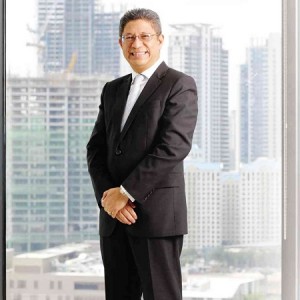There was a time when the job of a CFO—the “chief financial officer”—was one of the most routine and mechanical functions in a corporation.
In times past, CFOs used to be little more than a gloried title for the boss of a company’s group of “bean counters.” He was in charge of keeping a company’s balance sheet and income statements looking good, and he basically sent financial resources in the direction where the chief executive officer (CEO) wanted them to go.
In other words, a CFO was once viewed largely as a traffic cop who directed the flow of money from one street to the other.
No longer.
“Especially in today’s environment, the functions [of the CFO] have dramatically changed,” says Jaime Ysmael, who plays this role for Ayala Land Inc., the country’s largest real estate developer by market capitalization.
“A CFO no longer plays just the traditional role of bean counter or auditor—one whose only role is to safeguard the company’s finances.”
Indeed, the fast-evolving dynamics of the market—especially in the world of finance—dictate that the CFO’s role evolve along with it.
From being a company official in charge of looking at historical financial information, today’s CFO has to spend significantly more time looking forward and helping his boss, the CEO, get a better reading of the business landscape that looms ahead.
This is especially true for Ysmael who, as the head of Ayala Land’s vast finance group, has the role of ensuring that the risks associated with real estate projects with gestation periods that last years are matched seamlessly with the vagaries of the financial markets that move by the day. Or sometimes by the minute.
He is basically the chief risk manager for Ayala Land which is, in itself, a self-contained “conglomerate” composed of smaller real estate developers serving different market segments, along with their associated support firms—over 100 subsidiaries and affiliates for the property firm alone.
“The environment changes very rapidly, and today’s CFO has a vastly broader horizon to look at, both internally and externally,” Ysmael says. “It is a very challenging situation.”
But a close examination of the Ayala executive’s track record shows that he is well equipped to tackle such the challenges of managing billions of pesos of resources that course through the firm’s veins and arteries.
Ysmael is a 1980 summa cum laude accounting graduate of the University of the East. This landed him a job as a staff auditor with the country’s premier auditing firm Sycip, Gorres, Velayo & Co. The firm served as his springboard for a scholarship program at the University of Pennsylvania’s Wharton School, and later an executive education program with the University of Michigan’s business school.
“My foreign studies gave me a broad, international outlook,” he says, adding that his Wharton program even required him to learn a second language. He chose to learn Spanish—a language that would stand him in good stead with his future employer, the Ayala group, whose controlling family has its roots in Spain.
Armed with education from prestigious foreign universities and a cosmopolitan outlook, it did not take long for Ysmael to be noticed—and hired—by the country’s premier conglomerate.
He joined Ayala Corp. in 1991 as a division manager and quickly rose through the ranks, eventually being seconded to the group’s largest and most profitable arm—Ayala Land—in 1996 to serve as its CFO.
“In Ayala Land, I’m in charge of a lot of things, from the treasury group to planning and budgeting, to internal audit and even investor relations,” Ysmael says. “It’s an expanded role, beyond the usual roles of a traditional CFO.”
In many ways, his role in Ayala Land is that of a right-hand man to the CEO. And Ysmael—who was named the 2011 CFO of the Year by Dutch banking giant ING and the Financial Executives Institute of the Philippines—could serve as a model for the country’s other CFOs.
In his role as a risk manager, the CFO is no longer just a “bad cop” warning the CEO against the risks of taking the company in a certain direction. He is also a “good cop” who enables his CEO and the firm to go in new directions and give greater value to shareholders.
“A good CFO is a transformational CFO,” he says.
At Ayala Land, Ysmael is, at any given time, in charge of making sure that P30 billion of the company’s financial resources are directed to the unit that needs them. He believes that the external environment is about to get more challenging, as evidenced by the recently wild swings in the country’s stock and currency markets.
In facing the risks and challenges that the local corporate landscape is set to face in the near future, the country’s CFOs can look to Ysmael and learn a thing or two.
